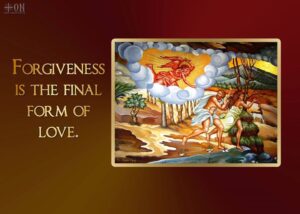Shubkono – The ‘Threshold of and Doorway to Great Lent’.

The problem of human strife is as old as mankind. It began on the outskirts of the Garden of Eden, when Cain driven by envy murdered his devout brother Abel. Ever since then, man fought with man, man has revolted against God and man has allied with Satan. But the five bleeding wounds of Christ on Mount Calvary reconciled man to God. “Behold, how good and how pleasant it is, for brethren to dwell together in unity! For there, the Lord bestows His blessing, even life forevermore’. This is how Israel’s sweet singer and glorious psalmist sings in Psalm 133.
Our Lord teaches us, “Love your enemies, bless those who curse you, do good to those who hate you, and pray for those who persecute you”. Love – bless – do good to – and pray for!!! Very often today, we hear angry words, spitefully spoken, commonly around us ‘I hate you’- I will never forgive you’! I will teach you a lesson.

The Holy Church begins Great Lent with the ‘Day of Forgiveness,’ and sets her journey into penitence and penance. ‘Forgiveness is the foundation of Reconciliation’. And so, kneeling and prostrating, her people look ahead to the Holy Resurrection (Kymtha), the great Feast of the Light.
The Sunday before the Great Lent is called the Pethratha Sunday. The Syriac word, ‘Peturta’ means ‘looking back’ or ‘reconciliation’. The season of Great Lent is the time of preparation for the feast of the Resurrection of Christ. Renewed devotion, prayer, fasting, and almsgiving, can be fruitful only with repentance and return to the great commandments of God. This liturgical Season of Great Lent is one of the kinds of introspection- looking back to one’s own life, and of real reconciliation in preparation of the Great Lent. The Great Lent is liturgically announced and inaugurated with the service of Forgiveness. Shubhkono service is all about love and forgiveness

The service of reconciliation is conducted on Monday, the first day if the Great Lent, at the end of third hour. The Service of Reconciliation or shubqono, stands at the ‘threshold of Great Lent.’ The service marks the actual doorway into Lent. This liturgical Season of Great Lent is one of the kinds of introspection- looking back to one’s own life, and of real reconciliation in preparation of the Great Lent. It is finishing of the old ways and returning to God. One of the hymns in the Shubkono liturgy says “Brethren, let us love one another, for it is the completion of the commandments.” Even the High Priest seeks the forgiveness of the people and paves the path, so that the people can come and reconcile. The Shubhkono service is on the first Monday of the Great Lent after the noon prayers. This service is a preparation for lent and forgiveness and is marked by 40 prostrations and the kiss of peace at the end of the service.
As we enter the Great Lent, let us be reconciled in our hearts, minds, and souls. O Father God, please help us to use this as an opportunity to truly understand the meaning of the prayer. You taught us through words “Forgive our debts and sins as we forgive our debtors.” Bless us so we may forgive. This year’s journey begins today. Yet even now, says the LORD, return to me with your whole heart, with fasting, and weeping, and mourning.
“Forgive our debts and sins as we forgive our debtors.”
The Gospel reading for the service is the “Parable of the Unforgiving Servant.” The Gospel reading reminds us that not only must we be willing to ask for mercy or forgiveness but we must be willing to practice forgiveness and mercy. “Be you therefore merciful, as your Father also is merciful.” (Luke 6: 36)

When our Lord was asked by the Apostle Peter how often he should forgive sin our Lord replied “Until seventy times seven” (Matt 18:22). Seventy times seven means that we are to be willing to forgive forever. This truly shows the extent of God’s love for us and the extent that we must be willing to love the sinner. Our Lord and Saviour Jesus Christ showed the greatest example of practicing forgiveness on the Cross and says “Father, forgive them; for they know not what they do.” (Lk 23:34) This shows the extent that we should be willing to forgive.
Rend your hearts, not your garments, and return to the LORD, your God. For gracious and merciful is he, slow to anger, rich in kindness, and relenting in punishment. – Joel 2: 12-13
Let us cast off the works of darkness and put on the armor of light, that having sailed across the great sea of the Fast, we may reach the third-day Resurrection of our Lord Jesus Christ, the Savior of our souls.
Forgiveness stands at the very center of Christian faith and of Christian life because Christianity itself is, above all, the religion of forgiveness. God forgives us, and His forgiveness is in Christ, His Son. Thus, truly forgiveness is both the beginning of, and the proper condition for the Lenten season.
Cleanse me in the waters of repentance, and through prayer and fasting make me shine with light, for Thou alone art merciful. Abhor me not, O Benefactor of all, supreme in love.
0 Comments